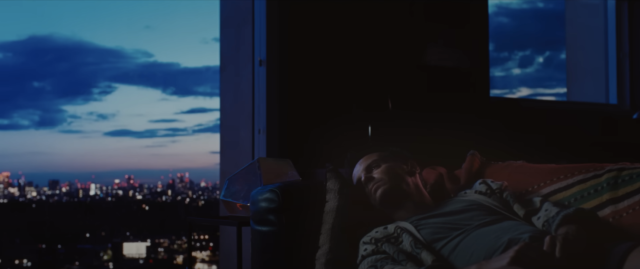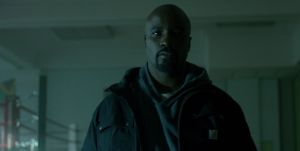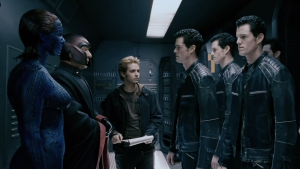
The post Excavating the Past: All of Us Strangers, The Summer with Carmen, Memory (AFI Fest 2023) appeared first on Battleship Pretension.
I remember writing, many years ago, “film is a memory.” It’s a nice, snappy, very broad statement to make, even if I no longer agree with it. Nevertheless, it has now served a new use as a way to introduce a few films from AFI Fest 2023 that explore the subject of memory, and people who are trapped, in one way or another, within theirs.
Andrew Haigh’s fifth feature, All of Us Strangers, has been picking up steam heading into awards season, garnering effusive praise on the festival circuit and picking up four nominations from the ever-shifting-standards of the Gotham Awards. Adapted from a novel (simply titled Strangers, it’s cleaner) by Taichi Yamada, it concerns a screenwriter (Andrew Scott) who visits his childhood home, only to find his parents – who died in a car crash when he was twelve – once again living there, the same age as when he last saw them.
Haigh changes the premise considerably by focusing less on any overt explanation and more on his own life. The house is in fact the same one he lived in as a kid, the parents (Jamie Bell and Claire Foy) are heavily modeled on his own, and rather than a woman as in the novel, the screenwriter becomes involved in a new relationship with a man in his apartment building (Paul Mescal). Haigh can hardly be accused of ignoring queer themes since his breakout second feature, Weekend, though one would have to look to his TV work to know. Onscreen – in the very fine 45 Years and Lean on Pete – he has otherwise, you’ll forgive me, played it straight.
His return to the subject matter here comes at a very different cultural moment. Much of that film dealt with the struggle one of the characters faces to come out, and the position queer people were in culturally in the years when public support was growing for same-sex marriage but it had not yet been legalized. Here, when Harry (Mescal) comes to Adam’s (Scott) door, he hardly has to hide he’s flirting with him. As Adam catches his parents up on all that’s happened since they died, they’re shocked to learn not only that he’s gay, but in the decades since, it’s really not that big a deal.
But the legacy of growing up in that time, with parents who wouldn’t have accepted him then, still haunts Adam. He admits to never having been in love, and feeling lonely much of the time. Harry reflects on how his own sexuality cemented a wedge between himself and his own family that was always kind of there. The past – our past – never really dissipates. Adam’s scenes with his parents are revealing, moving glimpses into the way we can still feel like children in adult bodies, how that need to be comforted and accepted still motivates much of our emotions, and probably always will. Haigh, cinematographer Jamie D. Ramsay (who shot last year’s gorgeous Living), and editor Jonathan Alberts utilize a lot of brilliant techniques to keep Adam slipping between worlds, to never fully resolve whether he’s dreaming, is seeing ghosts, or is already one himself. The cast plays into this dislocation, offering sincere performances that exist a beat outside of reality, as though every line is haunted by an unemphasized question mark doubting their existence.
It’s a really extraordinary film, pretty substantively Haigh’s best.
Queer memories fueling creativity (don’t get to use that segue everyday) also motivates Zacharias Mavroeidis’s The Summer with Carmen, which presents itself as a breezy fun summer flick only to reveal a more melancholic undercurrent only to then give everyone a hard time for expecting/wanting that breezy fun summer flick. It is, in short, a frustrating film in many regards.
Demosthenes (Yorgos Tsiantoulas) and Nikitas (Andreas Labropoulos) are two friends and former creative partners who are trying to find a bit of escape at a gay nude beach. Both are former actors; Demosthenes has moved into office work while Nikitas is trying to come up with a concept for a cheap feature to write and direct. Demosthenes suggests making a film about their friendship, centered around a summer he spent with Carmen.
Now then…it either took me way too long to pick up on or the film way too long to reveal that Carmen is a dog. I don’t really have any major reservations about the distinction here, though, because the film is altogether far too complicated for its own good. It’s layering multiple timelines together as Demosthenes continually jumps around to various scattered memories (an extended subplot surrounding his father’s declining health is particularly ill-fitting), on top of which layering on a general critique about formulaic, Sid Field-guided screenwriting (Field’s landmark book Screenplay makes an appearance). That last point comes out through on-screen text, dialogue, and its own convoluted structure.
More destructively, Mavroeidis tells his story with the stock Euro-art aesthetic permeating too much of digital cinema today, where the camera is locked down around a not-particularly-well-arranged shot with little movement inside of it. This lends a feeling of stasis to his potentially-spirited story, and while much of it revolves around Demosthenes’s own sense of being “stuck,” that hardly means your film needs to be too.
There are some moving passes between Demosthenes and his ex-boyfriend Panos (Nikolaos Mihas), who bought Carmen when they split up and begins to use her as a way to keep the two of them in touch, and Mavroeidis (who co-wrote the screenplay with Fondas Chalatsis) is very adept at sketching out his supporting cast so they all, regardless of how lengthy or brief their screen time is, feel like they have rich interior lives. It’s just attempting way too much and dragging itself down in the process.
Conversely, Michel Franco’s Memory is a welcome step down from his own instincts towards burdensome, static storytelling into something…actually kind of sweet?
This is the Mexican filmmaker’s second film in America, after 2015’s Chronic, and suffers from the same central weakness – where his work often goes to extreme places in depicting and addressing rape, both this and Chronic toy with his audience’s worst expectations, both of him and of art-house cinema’s general tendency to lean on trauma too blithely to stoke a reaction. Chronic opens with Tim Roth stalking a young woman, only to later reveal things about each of them that softens how we see those actions, and aren’t we just awful for suspecting otherwise.
In Memory, Franco has the good sense to turn those assumptions inward on his characters, chiefly Sylvia (Jessica Chastain), a sexual abuse survivor and mother of a teenage girl who assumes horrible things about Saul (Peter Sarsgaard) that may or may not. Admittedly, he didn’t start on a positive foot when he followed her home from a party and slept outside her front door. But both of their memories have been significantly marked by trauma and illness, and as they work through it on their own and together, greater truths begin to emerge.
The problems here are less moral, though, than narrative. At the Q&A after, Franco talked about how he expected to develop the film around the subject of Sylvia taking a sort of revenge on Saul, only to approach the story from a different angle. The screenplay, unfortunately, has the markings of something adjusted on the fly, as major revelations are quickly scuttled and never brought up again, and characters move in and out of decisions based on the needs of a scene.
Nevertheless, somewhat surprisingly, the film ultimately came through for me, largely due to Chastain and Sarsgaard’s chemistry, and an ultimate sweetness that is completely unexpected from Franco. The film is quite well attuned to how adults pass on their trauma to younger generations out of assumptions to same fates will befall them, how we hold onto perceptions of ourselves and others so strongly and ultimately lose sight of what’s most important, and how fallible memory is as a way of defining those things when all we really have is the present. Franco and his cast accomplish this without any huge speeches about these things – if anything, Franco’s brevity can sometimes be his undoing and I wished we’d gotten more from certain scenes – but through watching his characters gradually adjust themselves to each other, and really to themselves.
The post Excavating the Past: All of Us Strangers, The Summer with Carmen, Memory (AFI Fest 2023) first appeared on Battleship Pretension.
The post Excavating the Past: All of Us Strangers, The Summer with Carmen, Memory (AFI Fest 2023) appeared first on Battleship Pretension.




